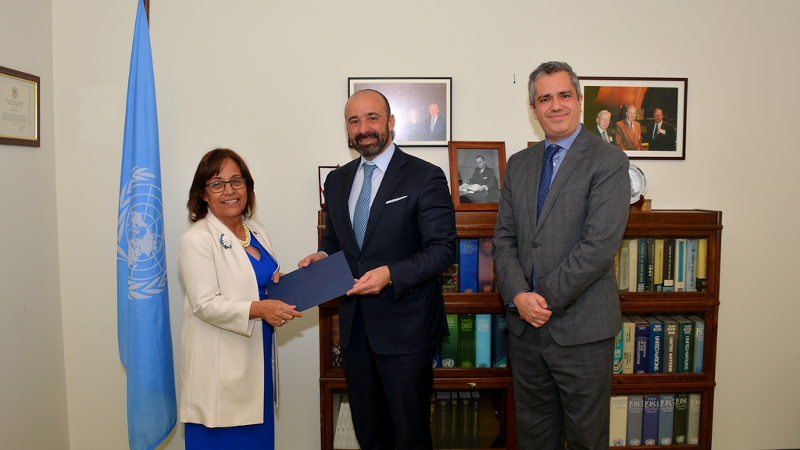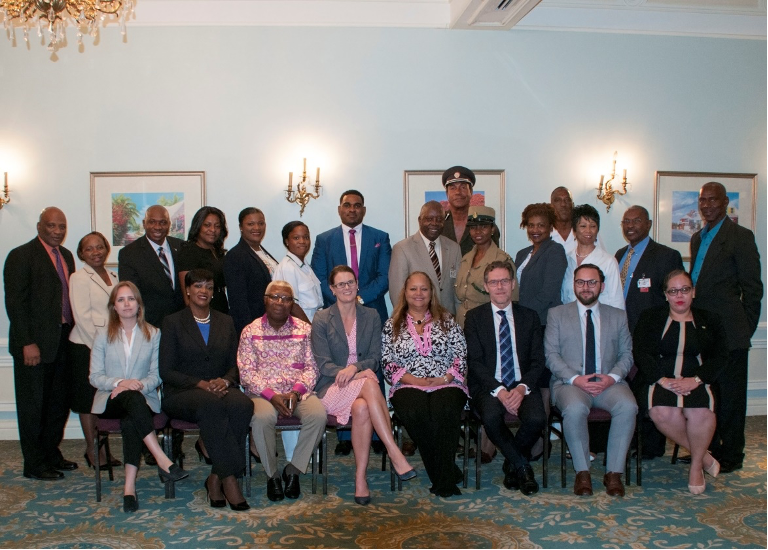
Ratification / Accession
Even though the general prohibition of torture is universal, the obligations of UNCAT are not yet universally applicable. This is because not all States are yet party to the Convention. When a State ratifies the Convention, they become an official party and have the opportunity to reap the many benefits the Convention has to offer.
CTI works with ODA-recipient countries on torture prevention and response, specifically on the implementation of UNCAT, both before and after ratification. CTI’s vision is that by 2024, all States will be party to the Convention and actively implementing it. Through peer-to-peer bilateral and multilateral engagement, CTI is available to assist the remaining non-States-parties as they take action towards the ratification of UNCAT. CTI’s support includes activities tailored to the individual needs of States and is not used to lobby or pressure. We provide one-on-one advice, such as assistance with legislative reviews, preparation of cabinet papers or building the “business case” for ratification.
Since CTI was launched, 20 States have become party to UNCAT. There are now 174 States parties worldwide, with only 21 countries left to join to achieve universal ratification. The full list of States parties is available here.
Ratification is not the end of the journey; it is a beginning. As States, we all face constraints and problems, and it is the view of the CTI that UNCAT can assist States with these challenges. It is actually impossible to have a so-called “perfect” record in advance of ratification. What does count is making a commitment, and using the Convention to advance relevant domestic changes.
H.E. Ramses Joseph Cleland, Ambassador and Permanent Representative of Ghana to the UN in Geneva
Why ratify UNCAT?

There are many good reasons why so many States have ratified the UN Convention against Torture. Here are 10!
- The Convention commits and guides States, through an incremental process of improvement, on effective torture prohibition, prevention, punishment and redress for victims.
- Ratification sends a powerful message that the ratifying State and the international community are united in their conviction that torture can never be tolerated under any circumstances.
- Almost uniquely amongst human rights treaties, UNCAT contains a practical list of steps to prevent torture and ill-treatment or punishment, while giving States adequate flexibility to tailor them to their own national context.
- The Convention strengthens the rule of law and the administration of justice, facilitates effective law enforcement and produces safer and well-managed prisons. This promotes stability, economic investment and the Sustainable Development Goals (especially SDG16).
- Ratification also provides a unique opportunity to redefine the relationship between the State and its citizens. It gives space for governments to correct historic or more recent incidents of violence or discriminatory policies, to abolish harmful practices, and to give voice to victims of torture to speak their truth. In so doing, relevant sectors raise awareness of appropriate standards of conduct.
- Ratification processes generally involve consultations with a number of stakeholders, with the effect of improving transparency and increasing public trust in State institutions and authorities.
- Becoming party to UNCAT can support States to put in place safeguards to prevent torture and ill-treatment and to provide remedies for victims. It provides an opportunity to review, improve or update existing laws, regulations, policies and procedures.
- Ratification also provides an impetus for enhanced training of law enforcement and other actors, and allows for exchanges between States on good practices and challenges.
- Ratification of UNCAT builds mutual confidence between States, relevant in such matters as non-refoulement and extradition.
- Ratification can lead to greater international support for needed domestic reforms in relevant sectors.
Download the infographic on 10 good reasons to ratify UNCAT here.
When to ratify UNCAT?
Ratifying or acceding to UNCAT is possible at any time. It is not a requirement to be fully compliant with the provisions of the Convention prior to ratifying it. However, it is important to prepare steps that will be taken towards compliance upon ratification. These steps generally include:
- internal consultations with a wide range of stakeholders
- identifying existing legislation, policies and practices related to torture and ill-treatment
- identifying strengths, gaps and areas for improvement
With this objective in mind, CTI offers in-country seminars helping States raise awareness about UNCAT among public officials and other relevant stakeholders and better understand the obligations and benefits that it will bring to a country. Such seminars can include sessions on brainstorming about priorities and preparing a roadmap for implementation.

Opportunities to ratify!
UN treaty event in New York
Every year the UN Secretary General invites UN Member States to sign, ratify or accede to international treaties at a special event in New York. Taking advantage of the presence at the UN General Assembly (UNGA) of Heads of State or Government, Ministers of Foreign Affairs, or other authorised representatives, the Treaty Event takes place during the General Assembly’s General Debate. Ratifying during this special event generates media interest and can be a rallying point for showing public commitment to the fight against torture. CTI monitors deposits and is available to assist delegations while in New York through our Core States.
Read about the annual treaty event here.
Committing to ratify at the UPR
Calling on States to ratify UNCAT and improve their implementation on torture-related themes consistently come top of the recommendations made in the UN’s peer-review exercise, known as the Universal Periodic Review (UPR). Pre-empting these recommendations by taking proactive steps to deliberate on ratifying the Convention, undertaking educational seminars or technical visits by CTI or other partners, and/or signing or depositing the instrument of ratification/accession ahead of the review, is a sure way to show commitment to this issue and simultaneously receive praise for doing so.
Learn more about the UPR here.
Candidacy for the Human Rights Council or other positions
Committing to ratify human rights treaties has been part of the candidacy of a number of States vying for seats on the UN Human Rights Council.
How to ratify UNCAT?
A toolkit for taking executive action on ratifying the Convention
All you need to know about the process of ratification/accession to UNCAT is made available in this free CTI UNCAT Ratification Toolkit.
Read about how States prepare to become parties to UNCAT.
This toolkit compiles critical information on the procedures and matters to consider before and upon UNCAT ratification/accession.
It is intended for State officials to be fully aware of why, when and how to sign, ratify or accede to UNCAT, and includes several annexes offering complementary materials which offer answers to the most common questions raised by States.
The full toolkit is available here.
Some of the annexes can be accessed separately here :
1. When to ratify UNCAT and OPCAT?
2. Ratification, Accession, Reservations and Declarations to UNCAT
3. Templates for Ratification, Accession, Reservations and Declarations to UNCAT
4. Initial reports to the Committee against Torture – General Guidelines
5. Checklist – Compiled list of elements for anti-torture legislation
6. Work of the Committee against Torture
7. Difference between anti-torture mandate holders
If you can’t find what you’re looking for in the toolkit, CTI can provide tailored advice on how to ratify or accede to UNCAT, including answering questions regarding reservations, declarations and other procedural matters. Don’t hesitate to contact our Advice Hub at advicehub@cti2024.org.

